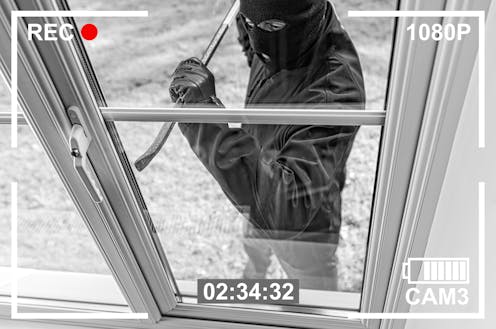how to keep your home safe these holidays
- Written by Natalie Gately, Senior Lecturer and Researcher, Edith Cowan University

The lead-up to the holiday period is often referred to as the silly season — but it is when offenders get serious; burglary rates tend to increase during the festive season.
Why? Homes around this time of year are often full of Christmas presents, so there is a lot of new merchandise to attract burglars. And sometimes people also break into houses looking to steal food and goods they need, or items they can pass on as gifts – and burglars know there’s a good chance the home will be empty during the holiday season.
Our research has focused on finding out more about why offenders commit burglary, what they’re looking for, and how they decide which house to target. Here’s what you need to know.
Read more: 'I go for the food': what children and young people told us about why they steal from houses
How do burglars pick which house to target?
Burglars tell us they choose houses that are easy to access, often looking out for unlocked windows and doors.
Some kind of cover is important, too. Are there large or overgrown plants they can hide behind? Are they hidden from view of main roads or neighbours?
Finally, they want the burglary to be worth it; ideally, they want valuables that are easy to access, conceal and sell on. Examples include online package deliveries, small electronics, jewellery, cash or gift vouchers.
Any valuables visible from windows or left in gardens or driveways are considered fair game.
Protecting your home while you are away
Over the holiday period many of us take some well-deserved time away, so how can you reduce the risk of burglary while you’re out of town? It helps to understand what “types” of burglars there are.
We sort burglars into three categories:
“opportunists” are not out to burgle but will if they see something they fancy
“searchers” are planning to burgle but have not selected the premises yet; and
“planners” are more professional and will watch or “case” a property in preparation for a burglary.
To best deter opportunists, keep valuables out of sight. Garage doors should stay shut and don’t leave empty cardboard boxes lying around near the bins. These empty boxes advertise your new Christmas acquisitions, and should be kept out of sight away from the kerb until bin day.
To reduce the risk of becoming a target for searchers, lock your doors and windows. Remove hiding places from your front door or rear access so they cannot remain hidden while breaking into the house.
We also know searchers look for houses that are obviously empty of people. If you’re going away, ask someone to put out and bring in your bins and collect your mail, so a loaded letterbox doesn’t advertise an empty home.
Planners usually target homes that will produce a significant haul but are deterred by sophisticated security systems and alarms. They can often recognise a decoy security camera for what it is.
All burglars we’ve interviewed have reported not liking dogs, alarms, neighbours or anyone who could potentially identify them.
Our previous research shows burglars are aware of old tricks such as leaving a radio or light on constantly while you are away. Instead, you could try using timer-based indoor lights that come on in the evenings.
You should also resist the urge to announce your holiday plans on social media, and make sure your home contents insurance is up to date and you have individual items photographed and insured.
Older children home alone during the holidays? Make a plan
School holidays are long and most parents’ annual leave won’t doesn’t cover the entirety of the school break. That means older children are often left home alone while their parents are at work, particularly in January. It’s important you speak to your children about how to reduce the risk of your house becoming a target while they are home alone.
If your children are coming and going during the school holidays, make sure they know how to lock up the house and remind them not to leave their valuables in view.
It is common for young people to leave new bikes, skateboards and scooters outside the front door. Put reminders up so they remember to take them inside, or out of view.
When young people return home, teach them to take notice of anything that looks out of place. If they suspect someone has been in the house, tell them not to enter but go to a trusted neighbour, call their emergency contact, or contact the police. That way they stay safe and do not interrupt a crime in progress and put themselves in danger.
Our recent research showed when young people target a house, the most common method they use is to knock on the door and see if someone is home. If it looks like someone is coming to the door, they run.
We quite often tell young people at home not to open the door when parents and caregivers are out. You might consider whether you feel comfortable with them making it clear someone is home (by calling out or making some noise inside) but not opening the door. It’s up to you to develop a strategy you and your children feel comfortable with.
Read more: Home alone: how to keep your kids safe (and out of trouble) when you’re at work these holidays
Authors: Natalie Gately, Senior Lecturer and Researcher, Edith Cowan University





